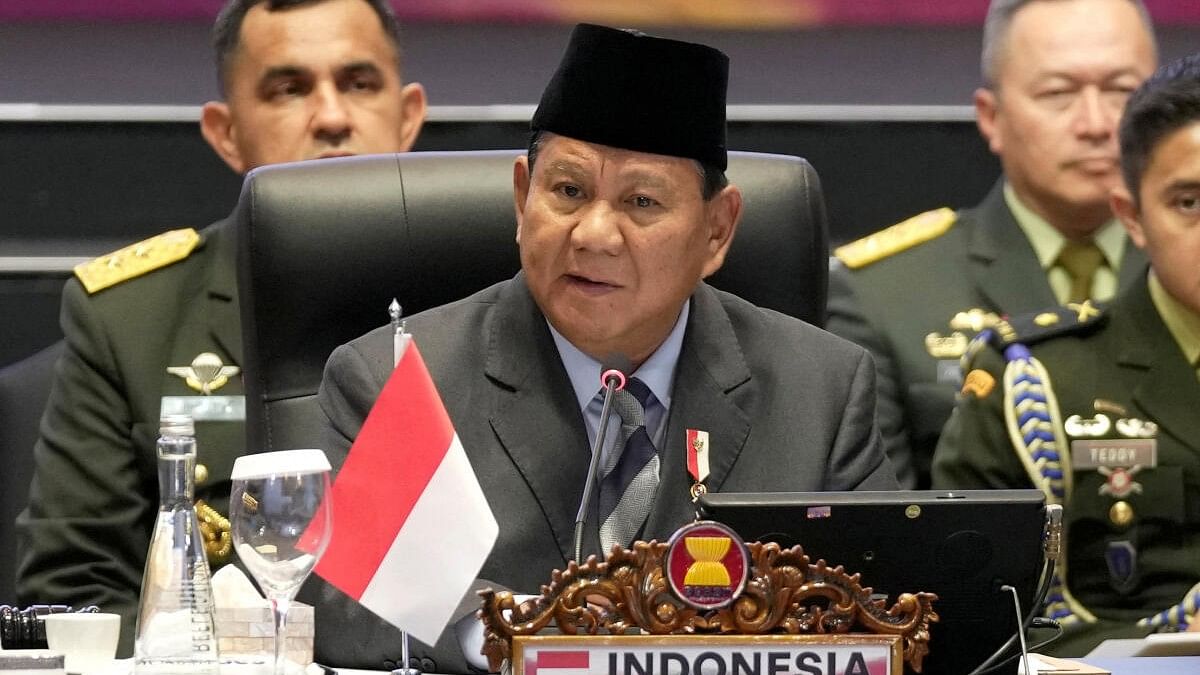
Indonesia's Defense Minister Prabowo Subianto.
Credit: Reuters
By Karishma Vaswani
Indonesians will get a chance to hear from their presidential and vice-presidential hopefuls in the first of five televised debates this week. The theme of the discussion is, among other issues, human rights. It should provide an opportunity for voters in the world’s third-largest democracy to probe the caliber and character of the front-runner for the country’s top job.
That man is Prabowo Subianto, the current defense minister and twice a runner-up in the archipelago’s presidential elections. He’s hoping three’s a charm — and he could be right. Polls show that he is popular among young voters who appear to love what has been described as his “cute” and “cuddly” grandfatherly image on social media. A survey by the Indonesian news outlet Kompas showed that 32.7 per cent of Gen-Z voters aged 17 to 26 years preferred Prabowo to the other two candidates. The shine wears off a little for Gen Y — aged 27 to 41 years — but even in that demographic he doesn’t do too badly, with around 24 per cent saying they would support him as president.
Granted, his social media game is strong. There are hashtags describing him as “gemoy,” Indonesian slang that is best loosely translated as huggable, a dance meme lifted after some steps he broke out into at a recent rally went viral, and there are t-shirts and cartoons featuring an animated, portly and cherubic-faced Prabowo. All of this would be fine if not for the fact the former special-forces commander was dishonorably discharged for alleged human-rights violations in East Timor, and in relation to the deadly riots leading to the fall of the previous president and dictator Suharto’s government.
In 2014, as Prabowo prepared to stand for yet another presidential election, I met and interviewed Raharja Jati, one of dozens of anti-Suharto activists kidnapped and tortured by Indonesia's special forces when he led them. At the time, he told me it would be unthinkable to have the former general as president, and worried that he would take democratic Indonesia back to the days of dictatorship. Prabowo has consistently denied the claims.
Still, many question why in a country of 270 million people, the man most likely to be president is a throwback to the old authoritarian era, the Orde Baru, as it was called, a 32-year rule of one of the most corrupt and dictatorial leaders in Southeast Asia’s history. Student activists and ordinary people who fought against the previous regime are asking themselves what Prabowo’s ascendancy means for Indonesia’s democratic transition, and whether it implies a fresh role for the military in politics.
The dismantling of the defense forces’ role in government was a key reform in the post-authoritarian era, but in recent years, there has been a resurgence of support for the army’s involvement in public life, as Burhanuddin Muhtadi, a visiting fellow at the ISEAS – Yusof Ishak Institute, notes. He adds that there has been a rise in public approval for a military government and strongman leaders — trends which could lead to the growing involvement of generals in non-traditional roles.
These are the topics young voters should be reflecting on as they make a pivotal decision in February when the world’s most populous Muslim nation heads to the polls. But they are unlikely to resonate with the new generation, Alexander Arifianto, senior fellow at the Singapore-based S. Rajaratnam School of International Studies told me. “The issues for the young people are the economy, jobs, whether I can buy a nice house or not,” Arifianto says. “When the opposition says that a vote for Prabowo means you’re voting against democracy, it doesn’t resonate with the youth, because they don’t remember those times.”
What could potentially count against him with some is the choice of his running-mate: Gibran Rakabuming Raka, the current president Joko Widodo’s eldest son. It’s being seen as a sign that nepotism and cronyism, hallmarks of the Suharto-era, are returning to haunt yet another generation. None of this has materially hurt Prabowo’s image so far, and he looks set to meme and dance his way to the electoral contest next year. It would be prudent for Indonesia’s voters to remind themselves that social media stars rarely make for good leaders. They should get off TikTok and hit the history books instead before they make their decision.